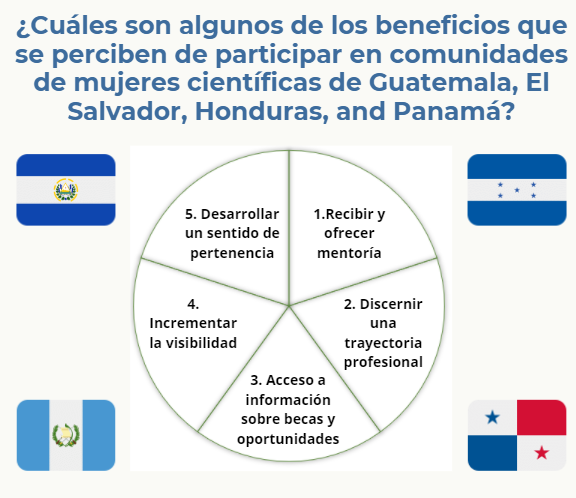La formación y participación en espacios colectivos resulta estimulante para científicos y científicas. Particularmente, los agrupamientos de mujeres investigadoras pueden resultar beneficiosos para sus integrantes en varios aspectos, tales como el aumento en la producción científica, superación de barreras de género en la ciencia y acceso a posiciones de liderazgo. Por ello, cuatro mujeres integrantes de DiploCientifica, junto a tres investigadoras más, todas de la región de América Central, desarrollamos un estudio que buscaba responder dos preguntas: ¿Qué experiencias de construcción de comunidades de mujeres científicas se tienen en América Central? y, ¿Qué reflexiones pueden extraerse desde la perspectiva de la Diplomacia Científica? Por varios meses, nuestro grupo que incluye representantes de Guatemala, El Salvador, Honduras y Panamá procuró responder a estas interrogantes, logrando recabar hallazgos interesantes que se reportan en un artículo científico disponible en este enlace. Las conclusiones son bastante reveladoras: por una parte, se identificaron pocas experiencias de asociatividad o participación grupal de manera sostenida por parte de mujeres científicas en los países estudiados. Esa escasa vinculación se explica por múltiples y diversas barreras partiendo de lo individual, pasando por obstáculos que se encuentran en el ámbito familiar, institucional, hasta estructuras sociales. En el estudio también se identificaron factores que facilitan, así como otros que inhabilitan la construcción y/o participación en comunidades por parte de investigadoras centroamericanas. Por último, también fue posible establecer motivaciones y beneficios que se potencian al formar parte de colectivos de mujeres investigadoras.
Contextualizando el estudio desde la perspectiva de la Diplomacia Científica, fue muy interesante resaltar el trabajo que realiza la Organización de Mujeres en Ciencia en el Mundo en Desarrollo (OWSD por sus siglas en inglés) creado por la UNESCO y la TWAS (Academia Mundial de Ciencias) en 1993 que se enfoca en realidades de rezago científico y tecnológico, como muchos de los países latinoamericanos, que además reflejan considerables brechas de género. A través del mecanismo de Capítulos Nacionales de la OWSD, la organización internacional apoya con entrenamientos, reconocimientos y otras oportunidades a mujeres enfocadas en investigación científica de todas las áreas del conocimiento. Por ello, la existencia de OWSD Guatemala y OWSD Honduras representa un espacio de crecimiento y desarrollo para sus integrantes. Como mujeres latinoamericanas apreciamos estas oportunidades e invitamos a todas las amigas a ser parte de nuestra comunidad, sin costo, haciendo su registro en este enlace.
Science Diplomacy and Community Participation among Women Scientists in Central America
By: Kleinsy Bonilla, Johana Cabrera, Ivonne Torres-Atencio and Karina Aquino
The building and participation in collective initiatives are stimulating for scientists. In particular, groups of women researchers can benefit from belonging to groups in several aspects, such as increasing scientific production, overcoming gender barriers in science, and access to leadership positions. In this sense, four women members of DiploCientifica, and three other female researchers, -all from the Central American region-, developed a study that sought to answer two questions: What are the experiences of building communities of women scientists in Central America? And which implications can be drawn from the perspective of Science Diplomacy? For several months our group, studying the cases of Guatemala, El Salvador, Honduras and Panama, tried to answer these questions. Interesting discussion and findings are reported in a scientific article available at this link. The conclusions are quite revealing: on one hand, few experiences of associativity or sustained group participation by women scientists in the countries studied were identified. This scarce community participation can be explained by multiple and diverse barriers. These barriers range from the individual obstacles to barriers found in the family and institutional spheres, also in social structures. The study also identified factors that facilitate, as well as others that hinder the construction and/or participation in communities by Central American women researchers. Finally, it was also possible to establish motivations and benefits that are enhanced by being part of the collectives of women researchers.
And contextualizing the study from the perspective of Science Diplomacy, it was fascinating to highlight the work carried out by the Organization of Women in Science for the Developing World (OWSD), which was created by UNESCO and TWAS (World Academy of Sciences) in 1993 and focuses on realities of countries that are scientifically and technologically lagging, such as many Latin American countries. The region also shows considerable gender gaps in science. Through the mechanism of OWSD National Chapters, this international organization supports women focusing on scientific research in all areas of knowledge via training, recognition and other opportunities. Therefore, the existence of OWSD Guatemala and OWSD Honduras represents a space for growth and development for its members. As Latin American women we appreciate these opportunities and invite all our friends to be part of our community, with no costs, by registering through this link.
